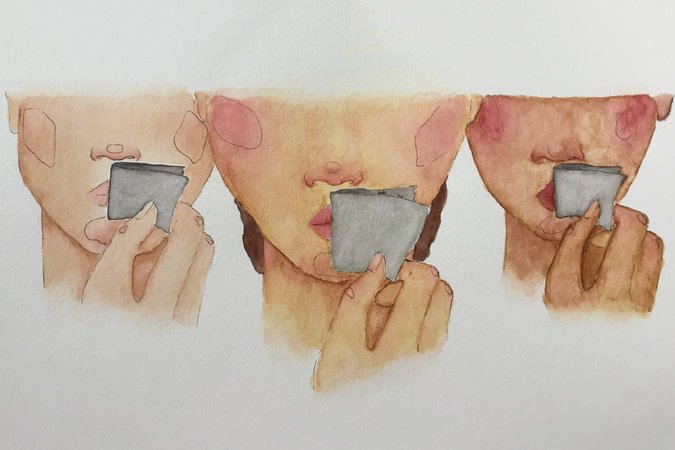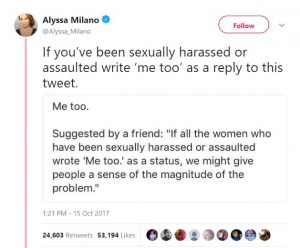
Time’s up: Here’s to breaking silence and saying ‘me too’
Peeling Back the Silence (Graciella Delgado, 2017)
“You took away my worth, my privacy, my energy, my time, my safety, my intimacy, my confidence, my own voice, until now” Anonymous
by Ana Maria Ortiz
It was January 2015. I remember sitting in class, scrolling through Twitter, waiting for recess, when suddenly I stumbled upon a barricade of tweets, a mix of sadness, outrage, pity, disbelief. Brock Turner had raped an unconscious, half-naked young woman behind a dumpster, and she had written it all in a letter. I opened the article from Buzzfeed News, expectant, fearful and unsettled, feeling like I was being welcomed into an intimate event in which I had no place. An event where open wounds, a broken spirit and pain were displayed for the world to see. The girl, who decided to remain anonymous, stood in front of the jury and addressed her aggressor directly as she read her testament, a narration of what had happened that night and how she felt, and feels. She wrote what it was like being told she was raped and what it was like trying to live her life as a survivor of an incident that she has no memory of, an event that could have been unreal, if the scars had not been all over her body. She told him what she lost, how her whole life seemed worthless and her body foreign. How she had to relearn her name and identity and internalise that she is more than the drunken victim at a frat party. The bell rang, but I did not stand up. I did not answer when my friends called my name. They came over to see what I was reading, and I showed it to them. We were silent, as I imagined the rest of the world to be, but the letter was loud, twitter was loud, she was loud, so in unison, we were loud too.
Three years ago, in light of the case of Brock Turner, women began a long overdue conversation. One that was about shame, privilege and accountability: The culture of rape. Having this discussion, openly and on a public platform was liberating and silencing at the same time. We dealt with backlash from the media and their all-too-common recycled narrative. They framed the aggressor as the victim, by privilege of his gender and to an extent race, a Stanford kid with a bright future and aspirations who could be “severely impacted by jail” as the judge stated. And the actual victim as a naïve girl who should have known better. Despite all the commotion and rage around the case, he only got six months of jail for a crime that under US Federal Law, was punishable, given the specific circumstances, for 15 years behind the bars. But justice can bend when the situation’s right. When the aggressor does not fit the profile of a criminal and the victim is deemed untrustworthy. So, instead of a fair sentence, they gave him six months. Six months, which later on turned into three. And nothing more. The narrative always follows the plot and, in most scenarios, we are never victorious.
We have to deal with the fact that we live in a world that does not validate rape victims and does not feel comfortable talking about sexual assault as a whole. Where the media have created a twisted discourse that somehow pins down the blame on the victims. Where how much you drank or what you were wearing is relevant. Where authorities diminish a crime and deny credibility. Where life-long taboos and stereotypes about victimhood are perpetuated, and the stigma that has prevented victims from regaining control, healing and breaking their silence has been exacerbated.

Alyssa Milano’s initial tweet
Even before the incident of 2015, many cases like the one presented above were already flooding mainstream media with the same overused plot-line, language and impunity towards the offender, however, the public solidarity was scarce, and victims felt trapped, misunderstood and alone. Nevertheless, something changed in October 2017 when actress Alyssa Milano sent a tweet (picture to the right) and it became viral. Women all around the world were empowered and encouraged to speak up and share their own stories of sexual harassment with the hashtag #MeToo. This lead to a global conversation about sexual violence that expanded from the local grassroots where it started to a global community of survivors and into the mainstream. The number of responses allowed people to feel, for the first time, that they weren’t alone. They felt included, recognized and heard, because they finally had a network of support which could very possibly mark the beginning of a route towards the de-stigmatization of the issue as a whole. The movement was originally founded in 2006 by Tarana Burke with the aim to ensure survivors that they don’t have to be on their own in this journey towards self-acceptance and rediscovery and to uplift a community in their healing process. But as I said, rape culture was overshadowed by shame and misconceptions, so it was really after Harvey Weinstein’s downfall that the slogan was adopted overnight by the world [CITATION Tar \l 12298].
The ingrowing revolution intensified when the New York Times published an investigation in which they exposed the hidden history of sexual harassment allegations against the Hollywood mogul and the settlements he paid to silence his victims for more than three decades. Many of the silence breakers who contributed to the exposé, said they felt they needed to suppress the experience because speaking up could be costly and more so when you are trying to uncover someone who not only is incredibly powerful, but someone who is working so hard to silence you. For them, as for most victims, it was clear that that’s how things were, “no platform, stick it up, accept it is what it is, powerful over powerless” as Sallie Hodges, one of Weinstein’s former employees and victims, said.
For a long time, this was Hollywood’s open secret. Rumours and allegations of Weinstein’s crimes were known and collectively shadowed. It was, and still is unnerving to realize that people knew he was a rapist but decided to be quiet. But then again, maybe it wasn’t the right time to expose him. There wasn’t a solid platform, language or even a full understanding of what it meant to be a rape victim. People needed a medium and that’s what this movement provided. A women-lead attack against the industry’s pervasive culture of abuse and shaming. As actress Gwyneth Paltrow said in an interview with The New York Times: “We’re at a point in time when women need to send a clear message that he is over”. Nowadays, women more than ever, feel empowered as they are given the opportunity to claim back their agency in a safe space.
Finally, alongside the stir caused by the movement, Hollywood actresses started a sister campaign called “Time’s Up” as the next step to #MeToo. Using their privilege, celebrities became pivotal to the enforcement of a new narrative. One, where even Hollywood’s greatest were affected by abuses, where your status or position did not exempt you from abuses. But also, one where victims were not timorous or silent and aggressors were held accountable. Coincidentally, parallel to the growth of the movement, award season started. Among them, the Golden Globes. Burke, alongside other activists, were invited and they used the time usually allotted to red-carpet chitchat to discuss sexual harassment and more importantly to create awareness and act as a wake-up call to everybody watching at home. This new way of campaigning has proven to be effective now more than ever due to our celebrity-driven culture. Because if they can stand up, with gowns and all, with full-on exposure to the whole world, then we too can peel back the silence and say, ‘Me too’.
For more information:

0 Comments